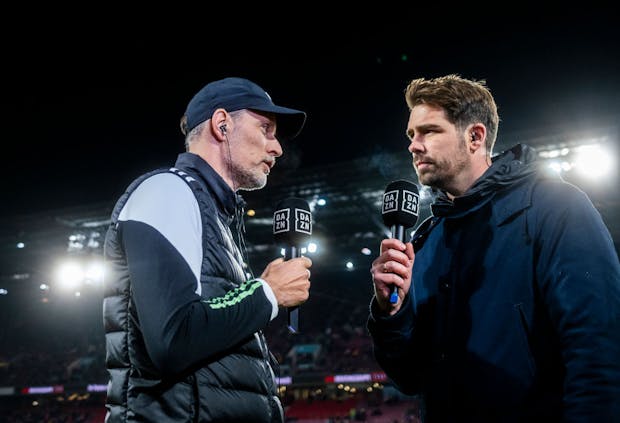
DAZN recorded an operating loss of $1.06bn (€969m) in 2022 on the back of increased rights fee commitments but higher direct-to-consumer revenues helped to reduce the figure by 22 per cent year-over-year, SportBusiness understands.
DAZN’s group loss was $1.25bn in 2022, down from $2.33bn in 2021. The huge disparity between the 2021 total loss and operating loss is due to the conversion of outstanding loans – from parent company Access Industries – into equity.
A markedly reduced operating loss is expected in 2023 following on from additional cost cuts and subscription price rises in key DAZN markets. The sports streaming broadcaster expects to be profitable in 2024.
Group revenues jumped by 41 per cent to just shy of $2.2bn in 2022, chiefly as a result of subscription price increases and the domestic rights to Germany’s Bundesliga, Italy’s Serie A and Spain’s LaLiga enticing new customers. This also helped the operating margin rise by 39 points.
DAZN’s annual rights costs rose by 23 per cent to $2.37bn, in part down to the addition of LaLiga rights in Spain from 2022-23, but also the first full year of higher Serie A rights costs, plus the new Bundesliga and Uefa Champions League contracts in Germany.
DAZN is exploring fresh funding alternatives and could look to raise as much as $1bn in the coming months, sources told Bloomberg earlier this month.
At the start of last year, DAZN conducted a major “recapitalisation” in the wake of heavy losses suffered over the course of the Covid-19 pandemic. The refinancing, which wiped DAZN’s debt, saw Len Blavatnik’s Access Industries subscribe to $4.2bn worth of new shares and turn loans – many of which were taken out in 2020 – into permanent capital.
DAZN continued to receive support from Access Industries in 2022 and again this year.
Through AI Perform Holdings LLP, Access Industries provided $730m in ordinary and preference share funding in 2022. As of the end of September, DAZN had this year received $240m in funding from the same source as the funding requirements have eased.
Operating costs
The hike in rights fee spending caused DAZN’s operating costs to rise from $2.9bn in 2021 to $3.3bn in 2022. Once rights costs are stripped out, operating costs fell by 9 per cent to $893.9m last year.
Content and marketing costs were trimmed from $509.6m in 2021 to $462.2m. The costs spiralled in 2021 as DAZN improved its production capabilities and made a move into the sports documentary sector.
The total staff headcount rose to 2,526 in 2022 after falling by 11 per cent in 2021. The number of technology staff rose to 889 (from 766) as DAZN continued to offset redundancies with a hiring drive at operations in Hyderabad and Katowice.
The technology operation is being overhauled with the switch to automated payment processes required for the nascent channels business headlined by NFL Game Pass with other league channels set to follow suit. Front-end platform changes are also required as DAZN continues to shift from purely an OTT streaming model to a wider consumer platform encompassing betting, gaming and e-commerce.
Despite redundancies made last year, staff costs rose to $290.2m (from $233.6m). News of the most recent staffing restructure emerged three months ago with redundancies primarily affecting staff in the UK and Amsterdam. In a memo sent at the time, chief executive Shay Segev said the structural changes were being implemented “to make DAZN a successful, dynamic and profitable business, and to invest in growth areas”.
DAZN’s direct-to-consumer business, headlined by its streaming operations, generated $2.12bn of revenues in 2022, up from $1.46bn a year earlier.
The broadcast partnerships operation accounted for the remaining $74.7m in revenues last year. The division services the company’s joint ventures with the International Basketball Federation (Fiba) and the Women’s Tennis Association (WTA) but no longer the European Handball Federation (EHF) after DAZN negotiated an exit from its 10-year tripartite agreement with the governing body and the Infront agency.
The $1.25bn overall loss reported by DAZN last year brings the company’s total losses over the past four reported financial years to over $6bn. As of the end of 2022, DAZN had $7.6bn in sports rights commitments going forwards.